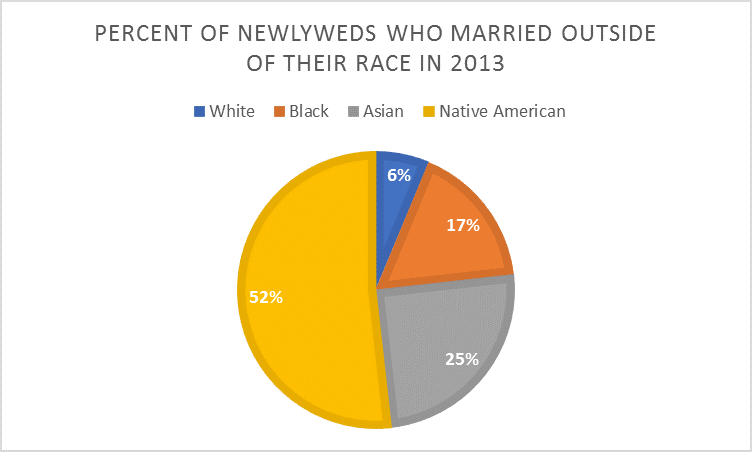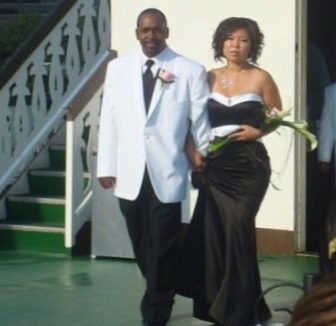
Krista Wilson
Data from Pew Research Center.
Ed and Naiah Holsey walked into her sister’s engagement party, hoping no one would make a scene about them being hand-in-hand.
“Why didn’t you come alone?” her sister asked.
The Holseys looked around the room to see her Korean family with disapproving glares and frowning faces.
“That was two years ago, which means we were married for 10 years when that happened,” Naiah Holsey said. “And they still couldn’t accept that I married a black man.”
Interracial, opposite-sex married couple households grew from 7 percent in 2000 to 10 percent in 2010, according to the U.S. Census Bureau. Yet racial tensions remain.
According to the 2015 Kaiser Family Foundation Survey of Americans on Race, 64 percent of Americans said tensions between racial and ethnic groups have increased during the last 10 years.
National race issues create stress

Courtesy of Naiah Holsey
Ed and Naiah Holsey pictured at a friend’s wedding.
Naiah Holsey, 52, and Ed Holsey, 58, said any relationship can have stress, but an interracial marriage adds pressure.
The couple lives in Detroit, where she works as an Allstate insurance agent and he owns a Jet’s Pizza in Southfield.
“When incidents happen where an officer kills an unarmed black man or even when there aren’t Amber Alerts put out on black children, it’s a huge deal to me because it hits home,” Ed Holsey said.
“My wife definitely gets bothered by things like this too, but her take on it is that police officers shouldn’t carry guns or every missing child should get an Amber Alert. I feel like she tries not to make anything about race, when race plays a role in the problem.”
Laura Alimayu, 29, and Husani Alimayu, 30, from Townsend, Massachusetts, have been together for seven years and married for almost five.
Laura is white and Husani is black.
Husani Alimayu said race-based events are troubling to him and his wife, but their relationship isn’t negatively affected by it.

Courtesy of Laura Alimayu
Laura and Husani Alimayu pose for a photo.
“There may be compromise sometimes, but we use our differences to build a stronger relationship, not weaken it,” Laura Alimayu said.
The media can be one of the complicators of an interracial relationship.
“For someone already in an interracial relationship, usually they know their partner well enough, so when they see their race negatively portrayed on the news, it won’t have an effect on the relationship but it could be stressful,” said Jessica Burke, assistant sociology professor at Francis Marion University in South Carolina.
“If a race is portrayed negatively by the media, their parents or friends may be less supportive because in their mind, the person you’re dating will fit those stereotypes, which can lead to tension within the relationship.”
Even one’s occupation can lead to a strain on the relationship when race is involved.
“I’m a black man and a police officer, so we have it from all sides of the fences,” said 42-year-old Omar Connor of Massachusetts. “On one point, I get the racism side of things, but at the same time as a police officer I see the hard choices we have to make to protect ourselves.”

Courtesy of Mandy Connor
Omar and Mandy Connor pictured with their daughter.
Some of his family do not like police officers and that adds to the tension as well, said Mandy Connor, 39.
“We had to learn to pay no mind to other people,” Mandy Connor said. “If they have a problem with it, it can remain their problem not ours.”
The Connors have been together since 1998 and married for 10 years.
Rejection by family and friends
“With some of the people I’ve interviewed, it seems it’s more OK for other people around them to date interracially,” Burke said. “It’s almost like it’s OK if their neighbor or friend wants to do it, but they don’t approve of it if it’s their child.”
The Holseys dealt with rejection of their relationship from Naiah Holsey’s parents at first.
“When Ed and I started getting serious, they couldn’t stand him because they wanted me to only date in my race,” Naiah Holsey said.
“My mother recently moved in to help us with the kids because we work so much. She loves her grandchildren so much and that is what made her finally accept our marriage.”
Disapproval of interracial dating from parents can put a strain on the relationship. Mackenzie Lea of Charlotte, Michigan, experienced that first-hand.
“My dad would always make stupid comments about my black boyfriend and point out the fact that he wasn’t white,” Lea said. “Whenever me and my boyfriend would get into it, he’d say ‘well maybe things would be better if you’d try dating a white boy again’.”
Lea, 22, who is white, said she prefers to date black men and hasn’t dated within her race since high school.
“It was a shock to my dad that I dated outside of my race. I guess it was kind of different for him because he grew up in Charlotte, which use to be KKK central and I would say my dad was affected by those views,” Lea said.
“Some people who are interracially married or dating may lose some social support from family and friends,” Burke said. “That’s a major stressor in a relationship.”
Lea said she had to go out of her way to keep her boyfriend from hearing how her dad felt. She said it got so bad that her and her father stopped talking for weeks and her dad finally called her to say he was sorry; it was just different for him.
Mandy and Omar Connor faced their share of ridicule from family as well.
“When a relative of mine found out I was dating Omar she asked why I was dating an (n-word),” Mandy Connor said. “We stopped speaking for a couple of years and she eventually came around and loves seeing my husband when we visit.”
She said her husband’s family wasn’t accepting of their relationship either.
“His niece and mother blurted out some racial comments towards me that led to a big argument,” she said.
Some interracial couples do have positive feedback from their inner circle, however.
“Race was not an issue when we started dating. Everyone was pretty supportive of us,” Husani Alimayu said.
According to a study by the Pew Research Center, 43 percent of respondents reported that more people of different races marrying each other has been a change for the better in society, while 11 percent say it has been a change for the worse.
Having biracial children
“Research also shows that even when family is supportive of their relative dating interracially, they tend to balk if marriage is in the picture,” Burke said. “A major reason for this is they don’t want their kids to have biracial children because of the pain and discrimination that can come with it.”
Seventy-one percent of blacks say they have experienced discrimination or have been treated unfairly because of their race, according to a study by the Pew Research Center.
Ed Holsey, who is black, said he has faced his share of discrimination and hopes his daughter “has opportunities based on her merit and is not limited because of her race.”
“Having a biracial child does raise concerns because she fits into two minority groups, which could cause her to face the disadvantages of both,” Naiah Holsey said.
The Holseys’ daughter, Isabella, is 9 and according to her father, Ed Holsey “loves being biracial because her lunches from home are way more interesting than her friends’.”